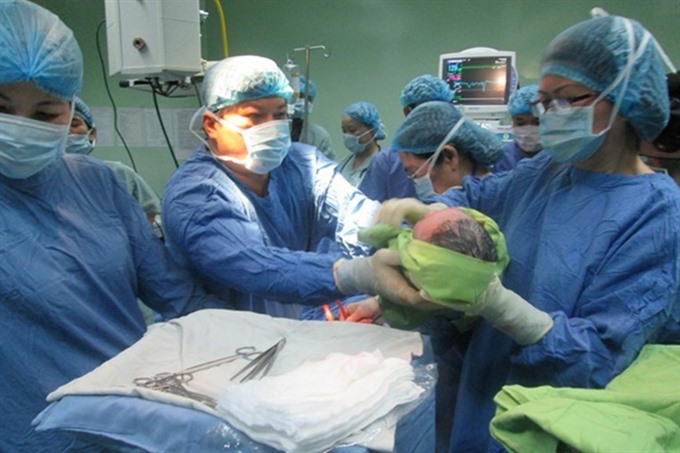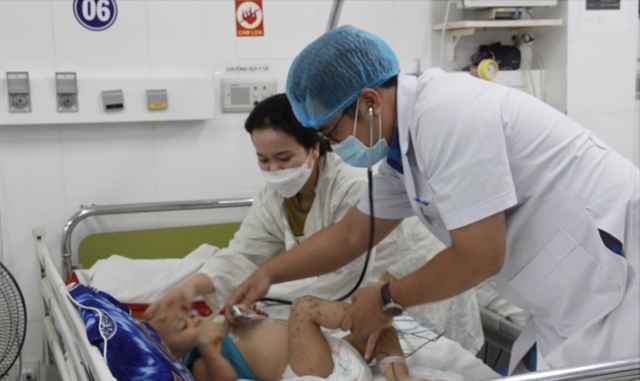 Society
Society

Four years ago, Đoàn Việt Hà and Phạm Thị Trang of Hải Châu District, central city of Đà Nẵng had their first son thanks to in vitro fertilization (IFV) treatment.
 |
| Director of Đà Nẵng Hospital for Women and Children Trần Đình Vinh (centre) and medical workers deliver the first baby born through IVF at the hospital in late 2014. — Photo laodong.vn |
ĐÀ NẲNG — Four years ago, Đoàn Việt Hà and Phạm Thị Trang of Hải Châu District, central city of Đà Nẵng had their first son thanks to in vitro fertilization (IFV) treatment.
The baby born on December 25, 2014 is one of the very first babies born thanks to IVF at the Đà
Hà said that his family was desperate: he and Trang could not have a baby for years despite three rounds of IVF treatment at other hospitals.
Trang said that as soon as the Đà
“The treatment results were over our expectations,” Trang said.
“The moment when I first saw my son was the happiest moment of my life,” Hà said.
Two other couples in Đà
They had all been hoping to have babies for years and had experienced a range of feelings along the way, including anxiety, happiness, disappointment and hope.
Director of the hospital Trần Đình Vinh is the surgeon who delivered the three IVF babies, all via caesarean section.
He warned that after IVF treatment, it can be a long path couples until the babies are born, and sometimes the procedure does not work.
“As an obstetric doctor, I feel happiest when helping a baby get out of the mother’s abdomen and uterus and then clean the baby’s mouth and nose,” Vinh said, adding that the feeling remained unchanged no matter how many babies he delivers.
He said that before the hospital’s Infertility Department was opened, couples in central regions, particularly in Đà Nẵng City, had to travel to Hà Nội, HCM City or went abroad to take IVF.
“Besides medical costs, changes in daily routines also greatly affect the mentality and treatment process,” Vinh said.
As of today, 370 babies have been born through IVF at the hospital. Nearly 100 women who became pregnant after IVF treatment are waiting to give birth.
Nguyễn Thị Phương Lê, head of the hospital’s Infertility Department, said that the success rate for IVF at the hospital was 35-45 per cent, quite good when compared with other hospitals in Việt
However, the rate also meant that failure is more likely than success, which creates pressure on both medical staff and infertile couples, Lê said.
“Having a baby is a journey that no one can exactly know and say when it ends. It can be one month, ten years or more. Meanwhile, giving birth to a baby requires efforts every minute,” Lê said.
Infertility treatment depends on factors including physical and mental conditions, age, time of starting medical treatment and treatment history.
IVF was usually considered the “last hope” for many infertile couples, Lê said. The process required strict conditions of darkness, temperature, humidity and oxygen concentration to create a fertilization environment like that in the mother’s uterus.
Fertilization occurs when the nucleus of both a sperm and an egg fuse to form a diploid cell, known as zygote. The successful fusion of gametes forms a new organism.
Hundreds of techniques are used to raise the organism and transfer it into the mother’s body. All moves must be done exactly and carefully as much as possible to increase the chances of success, Lê said.
“The birth of every baby creates fresh happiness for us just like the first IFV baby did,” Lê said.
In difficult cases, both doctors and patients burst into tears when informed that the IFV was successful and a baby will come to life, Lê said, “because they are out of our expectations or we didn’t dare to think about such fruitful results.”
Arriving at the Infertility Department, people usually find it very quiet. No noisy talks or laughs of pregnant women sharing experiences giving birth or raising children. No anxious or expectant faces of fathers-to-be.
Alongside the quietness is the unspoken desire of the couples to become parents. They seemingly step in silence as they are afraid that any noise or loud voice could “break the vulnerable opportunity” to have a child.
Doctor Lê said that as long as there is a hope and couples want to continue the journey, the doctors would be with them. — VNS









